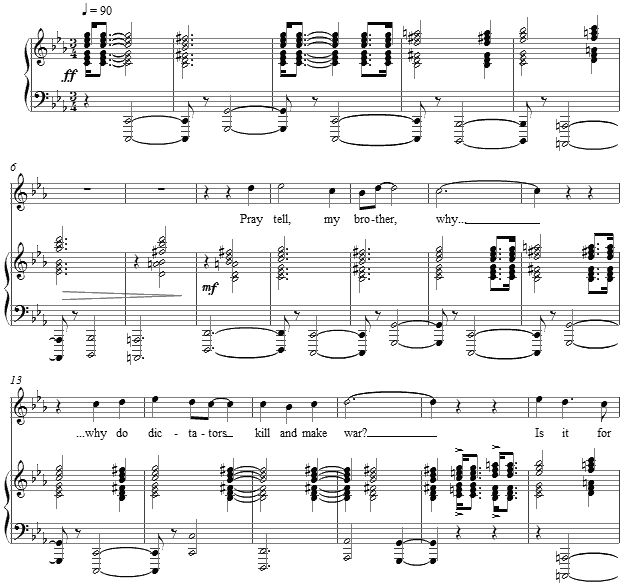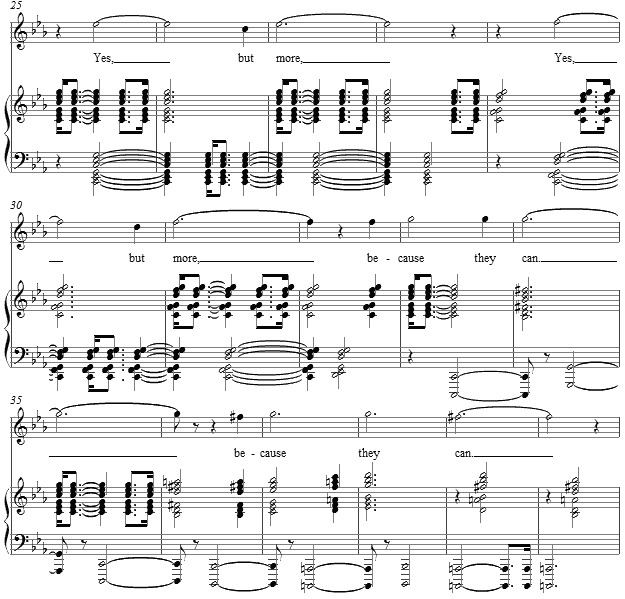Music and Texts of GARY BACHLUND
Vocal Music | Piano | Organ | Chamber Music | Orchestral | Articles and Commentary | Poems and Stories | Miscellany | FAQs
Pray tell, my brother, why - (2008)
Rudolph J. Rummel
for low, medium or high voice and piano
Pray tell, my brother,
Why do dictators kill
and make war?Is it for glory; for things,
for beliefs, for hatred,
for power?Yes, but more,
because they can.Used with the permission of R. J. Rummel
[ 2 pages, circa 1' 30" ]
Rudolph Rummel
I cam across this text on a web site devoted to the work of Dr. Rudolph Rummel, Professor Emeritus of Political Science, University of Hawaii.
Professor Rudolph earned his BA and MA from the University of Hawaii (1959, 1961) and Ph.D. in Political Science (Northwestern University, 1963); and holds honors of Phi Beta Kappa, Phi Kappa Phi, Omicron Delta Kappa. Rummel has taught at Indiana University (1963), Yale (1964-66), University of Hawaii (1966-1995); and is now Professor Emeritus of Political Science, University of Hawaii. His numerous grants and awards include those from NSF, ARPA, and the United States Peace Research Institute, and he has been frequently nominated for the Nobel Peace Prize, received the Susan Strange Award of the International Studies Association for having intellectually most challenged the field in 1999, as well as the Lifetime Achievement Award 2003 from the Conflict Processes Section, American Political Science Association, and the 2007 The International Association of Genocide Scholars' Award for Distinguished Lifetime Contribution to the Field of Genocide and Democide Studies and Prevention.
Professor Rummel has authored about two-dozen books and over 100 professional articles, including Death By Government (Transaction Publications, 1994), The Miracle That Is Freedom (Martin Institute for Peace Studies and Conflict Resolution, University of Idaho, 1996), Power Kills (Transaction Publications, 1997), and Statistics of Democide (Center for National Security Law, 1997). Rummel has documented and shown empirically that the power of freedom to improve human affairs extends as well to social and economic development, Not only is democratic freedom a method of nonviolence, it also is a means to wealth and prosperity. He shows, for example, that democracies never have a famine. He also goes beyond establishing these utilitarian benefits and shows that freedom is the basic right that people have aside from however it improves their lives.
Professor Rummel's informative and unnerving site, Freedom, Democide, War, is hosted by the University of Hawaii, and found at http://www.hawaii.edu/powerkills/welcome.html.
The text moved me towards a setting for its strength and directness, and Professor Rummel kindly gave permission for the text and poem to be available freely to all. The setting -- per the examples below as drawn from the edition in a medium key -- is direct, aggressively forward and simple. Declamando in style, it directs an audience forcefully to answer the question with the same conclusion as the remainder of the text explains in such a few words, and yet with such integrity.
The hammered-home musical rhetoric insists through its repeated six-note chords in treble and bass that there comes from this question one basic, glaring truth. "...because they can." For this the tessitura of the vocal line lies high and remains so for this short setting.
The score for Pray tell, my brother, why is available as a free PDF download in three keys, though any major commercial performance or recording of the work is prohibited without prior arrangement with the composer. Click on the graphics below for one of these piano-vocal scores.


